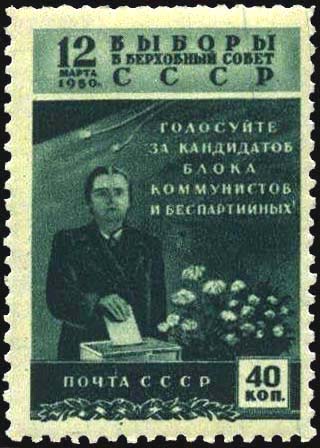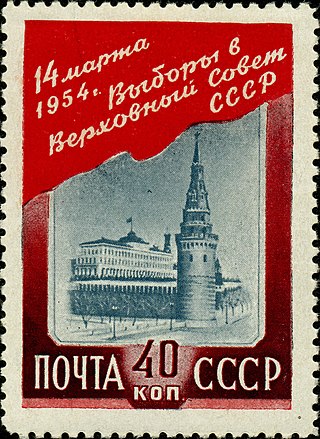Elections to the eleventh Supreme Soviet were held in the Soviet Union on 4 March 1984. They were the last in the Soviet Union to be held before Mikhail Gorbachev's policies of perestroika and demokratizatsiya resulted in partially free elections in 1989. They were also the last direct elections to the Supreme Soviet, as in 1989 deputies were elected to the Congress of People's Deputies, who then elected the Supreme Soviet.
Elections to the Supreme Soviet were held in the Soviet Union on 14 June 1970.
Elections to the seventh Supreme Soviet were held in the Soviet Union on 12 June 1966.

Elections to the Supreme Soviet were held in the Soviet Union on 12 March 1950.

Elections to the Supreme Soviet were held in the Soviet Union on 14 March 1954.
Elections to the Supreme Soviet were held in the Soviet Union on 18 March 1962.
Parliamentary elections were held in Hungary on 25 and 26 January 1920. However, they were only held in 164 districts. After the Treaty of Trianon was signed, the 44 districts previously occupied by Romania voted between 13 June and 5 July, whilst the 11 districts occupied by Serbia did not vote until 30 and 31 October 1921. The election was held with compulsory voting. In protest at this and other changes to the franchise that left 60% of the voting age population unable to vote, the Hungarian Social Democratic Party boycotted the elections, and called for its supporters to cast invalid votes, resulting in an unusually high number of blank or invalid votes – 12% in the January elections and over 20% in Budapest and other major cities.
Parliamentary elections were held in Hungary on 19 March 1967. The Hungarian Socialist Workers' Party was the only party allowed to contest the elections, and won 259 of the 349 seats, with the remaining 90 going to independents selected by the party.
Parliamentary elections were held in Hungary on 25 April 1971. The Hungarian Socialist Workers' Party was the only party to contest the elections, and won 224 of the 352 seats, with the remaining 128 going to independents selected by the party.
Parliamentary elections were held in Hungary on 15 June 1975. The Hungarian Socialist Workers' Party was the only party to contest the elections, and won 215 of the 352 seats, with the remaining 137 going to independents selected by the party.
Parliamentary elections were held in Hungary on 8 June 1980. The Hungarian Socialist Workers' Party was the only party to contest the elections, and won 252 of the 352 seats, with the remaining 100 going to independents selected by the party.
General elections were held in Italy on 27 January 1861, with a second round on 3 February. The newly elected Parliament first convened in Turin on 4 March 1861, where, thirteen days later, it declared the unification of the country as the Kingdom of Italy.

Parliamentary elections were held in Portugal on 16 December 1934, the first following the establishment of the one-party state known as the Estado Novo. The National Union was the only party to contest the elections, and no opposition candidates were allowed to run. It subsequently won all seats in the National Assembly, three of which were taken by women.

Parliamentary elections were held in Portugal on 30 October 1938. The country was a one-party state at the time and the National Union was the only party to contest the elections, with no opposition candidates allowed to run.

Parliamentary elections were held in Portugal on 1 November 1942. The country was a one-party state at the time and the National Union was the only party to contest the elections, with no opposition candidates allowed to run.
Parliamentary elections were held in Romania on 30 November 1952. They were the second held under communist rule, and the first under a constitution adopted that September. They were also the first held after longtime Prime Minister Petru Groza handed the post to Gheorghe Gheorghiu-Dej, who as leader of the communist Romanian Workers' Party (PMR) had been the country's de facto leader since the communists seized full power in 1947.
Parliamentary elections were held in Romania on 2 March 1969. The Front of Socialist Unity (FUS), which had been formed a year earlier to replace the People's Democratic Front (FDP), was the only organization that contested the election; no prospective candidate could run for office without the Front's prior approval. Like the People's Democratic Front, the Front of Socialist Unity was dominated by the Romanian Communist Party (PCR). The Front won all 465 seats in the Great National Assembly.
Parliamentary elections were held in Romania on 9 March 1975. The Front of Socialist Unity (FUS), dominated by the Romanian Communist Party (PCR) and including other mass organisations, was the only organisation that contested the election. No prospective candidate could run for office without the Front's prior approval. The Front won all 349 seats in the Great National Assembly.
Parliamentary elections were held in Romania on 9 March 1980. The Front of Socialist Unity and Democracy (FDUS), dominated by the Romanian Communist Party (PCR) and including other mass organisations, was the only organisation that contested the election. No prospective candidate could run for office without the Front's prior approval. The Front won all 369 seats in the Great National Assembly.

Folketing elections were held in Denmark on 14 June 1861. Carl Christian Hall remained Prime Minister following the elections.




